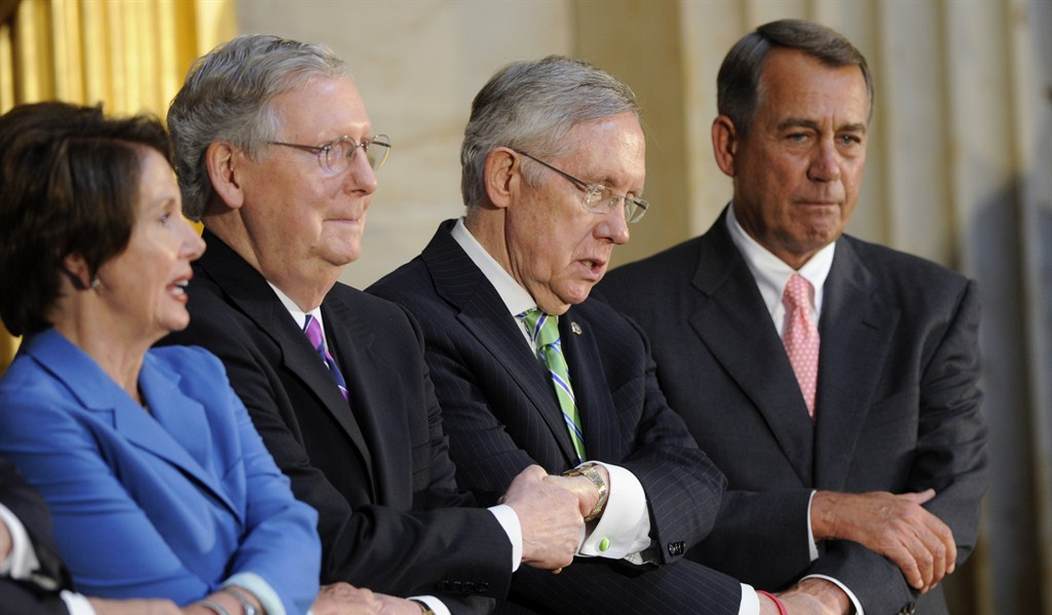I'm told that the public is "angry" at today's politicians. Eighty-two percent disapprove of the job Congress is doing. So will Tuesday's election bring a big shakeup?
No. Congressional reelection rates never drop below 85 percent.
The last big "wave" election was 1994, when Democrats lost control of both houses. The media called it a "revolution," and the late Peter Jennings from ABC likened Americans to 2-year-olds throwing a tantrum.
Even that year, the reelection rate was 90 percent.
Matt Kibbe of the group FreedomWorks and Hadley Heath Manning of Independent Women's Forum came on my show to say they don't believe that this will be the year voters "throw the bums out."
Incumbents have all sorts of built-in advantages, said Manning: "Once you're in office, you have network ties, usually with a big party organization, usually with other officeholders. You have ties to donors who have helped you in your previous round of fundraising."
In the U.S., she says, "we don't have kings, (but) we still have political dynasties."
Politicians in office game the system to make it tougher for outsiders to challenge them. They always talk about getting money out of politics. They don't mean getting taxpayer money out of their own end of politics -- all those privileges such as government mailings and websites and broadcasting facilities right in the Capitol Building. No, the money they want to limit is outsiders' money.
When Rep. Nancy Pelosi (D., Calif.) says "this money is suffocating the airwaves, silencing the voices of the many," she means she wants to prevent private groups funding political messages that sometimes criticize people like her. Expensive TV ads might allow unknown challengers to break through. Can't have that.
Recommended
Manning says Democrats who now push the idea of a Constitutional amendment to limit campaign ads "want to rig the system so that their donors are still able to give -- whether that's labor unions or people who typically support Democrats -- but they want to silence the opposition."
They make it sound as if labor union donations are a natural part of the democratic process -- but money from corporations and independent interest groups, by contrast, "interferes" with elections.
Sen. John McCain (R., Ariz.) led the charge against evil "outside" money when he got what he and reporters called campaign finance "reform" passed a dozen years ago. The Supreme Court wisely threw much of that out, because it was an attack on free speech. But there are still a million rules left -- plenty to discourage "amateurs" from attempting to participate in politics.
"The problem with campaign finance regulation is it allows for an insane amount of discretion amongst the regulators," says Kibbe. "So they can pick and choose who is punished for what. And it's really just a way to control political speech."
A better way to get new blood into politics would be term limits on elected officials.
Several states have them, and the result has been more turnover in legislatures. That's good news for taxpayers because studies show that the longer politicians are in office, the more they spend.
Saying most incumbents will win is not saying that the election doesn't matter. It does. It would be good for America if Republicans won the Senate, taking away Sen. Harry Reid's (D., Nev.) power to pass absurd farm subsidies or fatten flood insurance while blocking votes on the things such as the Keystone oil pipeline, charter school expansion and Yucca Mountain nuclear disposal.
Reid will probably lose his position as majority leader. But he'll remain in Washington with all the other big-spending blowhards -- from both parties -- who grow old and powerful there.
UPDATE: Last week I wrote that federal prosecutor Kathryn Ruemmler, part of the team of Justice Department bullies who unfairly manipulated the legal system to jail four Merrill Lynch employees, was reportedly President Obama's choice to replace Eric Holder as U.S. attorney general. A few days later, Ruemmler asked the president to withdraw her name from consideration.























Join the conversation as a VIP Member